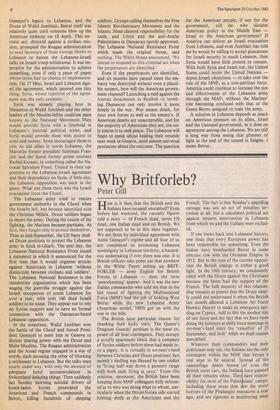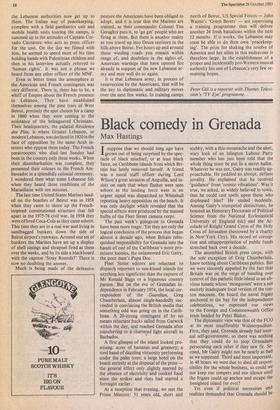Why Britforleb?
Peter Gill
How is it then that the British and the Italians have escaped unscathed? Even before last weekend, the casualty figures told a story — 16 French dead, seven US dead, one Italian dead and no British. We are supposed to be in this mess together. We are there by individual agreement with Amin Gemayel's regime and all four of us are committed to promoting Lebanese sovereignty in Lebanese territory, a hazard- ous undertaking if ever there was one. 11 is British officers who point out that nowhere in the White Paper setting up BRIT- FORLEB — army English for British Forces in Lebanon — does the term 'peacekeeping' appear. And it was the new Italian commander who told me that in the last round of fighting the Multinational Force (MNF) had the job of holding West Beirut while the new Lebanese Army (American model, 1983) got on with the war in the hills.
The British have particular reason for thanking their lucky stars. The Queen's Dragoon Guards' position is the most ex- posed of all four contingents. They occupy a scruffy apartment block that a company of Syrian soldiers before them had made in- to a pigsty. It is virtually in no-man's-land between Christian and Druze positions; last month's shelling was likened by one soldier to 'living half way down a gunnery range with both ends firing at once.' From this position, moreover, the British have been keeping their MNF colleagues fully inform- ed as to who was doing what to whom, par- ticularly when the Druze-Syrian side started lobbing shells at the Americans and the French. The fact is that Sunday's appalling carnage was not an act of mindless ter- rorism at all, but a calculated political act against western intervention in Lebanon from which we and the Italians were exclud- ed.
If one looks back into Lebanese history, one finds that every European power has been responsible for something. Even the Italian navy bombarded Beirut in some obscure row with the Ottoman Empire in 1912. But in the eyes of the current opposi- tion the British emerge in rather a good light. In the 19th century, we consistently sided with the Druze against the Christians because the latter had the support of the French. The folk memory of this relation- ship remains so potent that the Druze simp- ly could not understand it when the British last month allowed a Lebanese Air Force Hawker Hunter to make an emergency lan- ding on Cyprus. Add to this the modest size of our force and the fact that we have been doing the honours at daily truce meetings in no-man's-land since the 'ceasefire' of 25 September, and lnsh' Allah we shall remain unscathed.
Whatever their commanders and their politicians may say, the Italians are the only contingent within the MNF that betray a real urge to be neutral. Instead of the camouflage desert brown of even the British scout cars, the Italian have painted all their vehicles white. The have respon- sibility for most of the Palestinians' camps, including those areas that äw the worst horrors of the Phalangist massacres a year ago, and are rigorous in monitoring what the Lebanese authorities now get up to there. The Italian way of peacekeeping, complete with a field paediatrics unit and mobile health units touring the camps, is summed up in the attitudes of Captain Cor- rado Cantatore who acts as press officer for the unit. On the day we filmed with him, he seemed to spend most of his time holding hands with Palestinian children and then in his interview actually referred to 'human rights'. It was not a phrase we heard from any other officer of the MNF.
Even in better times the atmosphere at the American and French contingents was very different. There is, there has to be, a whiff of Empire about the French presence in Lebanon. They have established themselves among the pine trees of West Beirut, precisely the spot chosen for a camp in 1860 when they were coming to the assistance of the beleaguered Christians. Their headquarters, the palatial Residence des Pins, is where Greater Lebanon, or modern Lebanon, was declared in 1920 in the face of opposition by the same Arab in- terests who oppose them today. The French paratroopers who died last Sunday had been in the country only three weeks. When their disembarkation was complete, they presented their colours to the French Am- bassador in a splendidly colonial ceremony. I wondered then what some Lebanese felt when they heard three renditions of the Marseillaise with ten minutes.
The last time United States Marines land- ed on the beaches of Beirut was in 1958 when they came to shore up the French- inspired constitutional structure that fell apart in the 1975-76 civil war. In 1958 they were offered Coca-Cola as they came ashore. This time they are in a real war and living in sandbagged bunkers down the side of Beirut airport's runways. Around one set of bunkers the Marines have set up a display of shell casings and shrapnel fired at them over the weeks, and by its side a blackboard with the caption 'Stray Rounds?' There is now no doubting the answer.
Much is being made of the defensive posture the Americans have been obliged to adopt, and it is true that the Marines are trained, as their commander Colonel Tim Geraghty puts it, to 'go get' people who are firing at them. But there is another reality as you travel up into Druze territory in the hills above Beirut. For hours up and around those winding roads you remain within range of, and doubtless in the sights of, American warships that have opened fire already in support of the new Lebanese ar- my and may well do so again.
It is that Lebanese army, in process of resurrection by the Americans, that will be the key to diplomatic and military moves over the next few weeks. In training camps north of Beirut, US Special Forces — John Wayne's 'Green Berets' — are supervising a training programme that will deliver another 24 fresh battalions within the next 12 months. If it works, the Lebanese may soon be able to do their own 'peacekeep- ing'. The prize for shaking the resolve of America and her allies in this endeavour is therefore large. In the establishment of a proper and incidentally pro-Western neutral authority lies one of Lebanon's very few re- maining hopes.
Peter Gill is a reporter with Thames Televi- sion's 'TV Eye' programme.















































 Previous page
Previous page